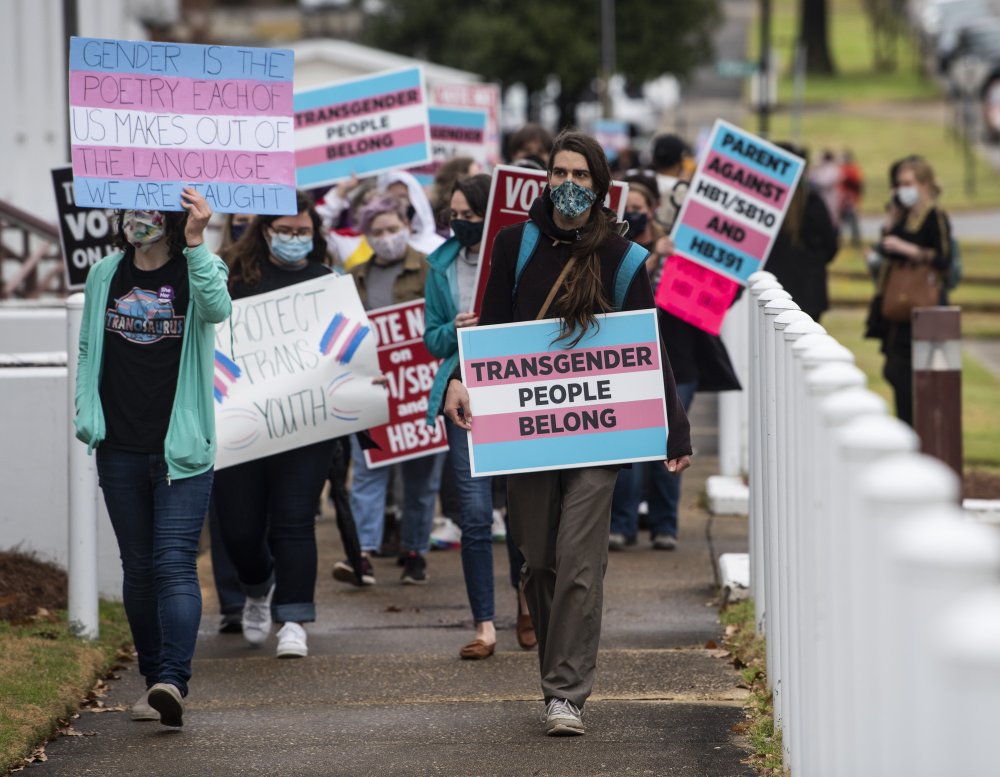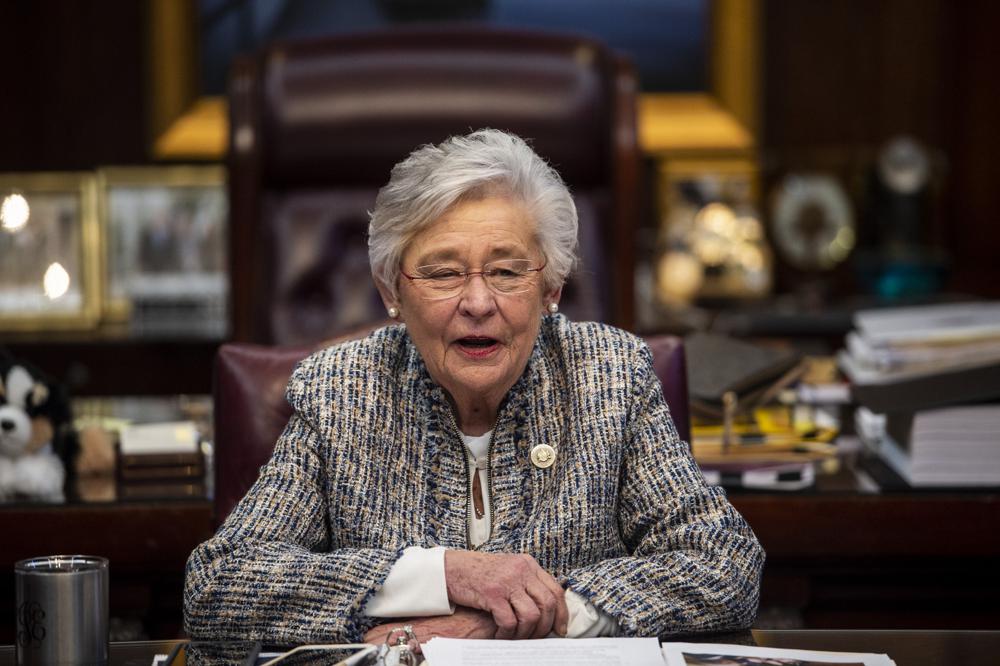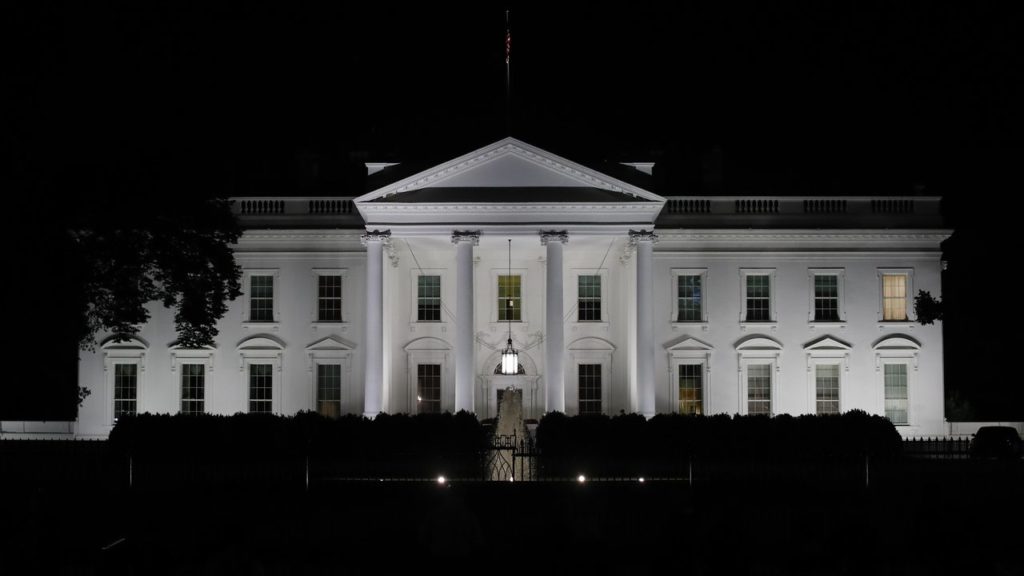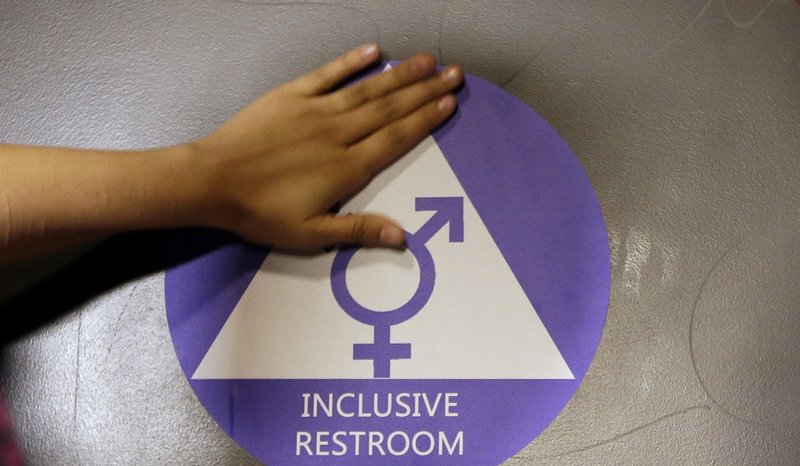Court hears arguments on Alabama trans youth treatment ban

Alabama asked an appellate court Friday to let the state outlaw the use of puberty blockers and hormones to treat transgender children — a move some parents argued violates their right to make decisions about their children’s health care. A three-judge panel of the 11th U.S Circuit Court of Appeals heard arguments in Alabama’s appeal of a preliminary injunction blocking enforcement of the first-of-its-kind law that would make it a felony, punishable by up to 10 years in prison, to give the medications to assist transgender minors in their transition. The arguments in Alabama come three months after the 8th U.S. Circuit Court of Appeals agreed to keep similar Arkansas law on hold. The bans have become a flashpoint as Republican-controlled legislatures advanced bills to not only block medical treatment but also ban transgender children from using school restrooms or playing on sports teams that don’t correspond with their sex at birth. Jeff Doss, an attorney representing five parents and a pediatrician who challenged the law, urged the court to keep the ban on hold. He said the law is discriminatory, and Alabama took the “unprecedented” step of trying to criminalize the accepted standard of care for a medical condition. “If parental freedom means anything, it means that a parent, not the state, should decide whether their child receives life-saving medical intervention, consistent with the standard of care,” Doss said. Doss said after court that “it should be chilling for everyone” that the state is trying to tell parents, “we know best, and we are the ones who are going to make this decision for you parents.” Edmund LaCour, Alabama’s solicitor general, argued that the state has the authority to regulate medical treatments it deems risky. He disputed arguments that the law discriminated against transgender individuals because the drugs are still available to everyone, just not “to affect a cosmetic sex change” “The law does not prohibit any sort of therapy. It doesn’t require that males go by he or that girls wear dresses. All it does is target the risky treatments,” LaCour said. LaCour, at one point, asked judges to imagine if children wanted to use skin grafts, a treatment for severe burns, to change their race. Doing so would just be too risky, he argued. Multiple medical groups, including the American Academy of Pediatrics and the American Medical Association, oppose the ban. The U.S. Justice Department has also opposed the ban as unconstitutional. Fifteen states filed briefs supporting Alabama’s efforts to ban the treatments. The appellate judges did not indicate when they will rule. U.S. Circuit Judge Andrew Brasher, who was Alabama’s solicitor general before he was appointed to a federal judgeship, asked both sides if the law amounted to sex discrimination and if the state had other regulation options, short of an outright ban, if it was concerned about the possible overuse of the medications. Arkansas was the first state to enact such a treatment ban. A federal judge last year blocked the Arkansas law from going into effect, and the appellate court upheld the decision. A trial began last month in the lawsuit seeking to permanently strike down the ban. The Alabama law, dubbed the Vulnerable Child Compassion and Protection Act, went further in putting criminal penalties of people who provide the medications. U.S. District Judge Liles Burke in May issued a preliminary injunction to stop Alabama from enforcing the medication ban. Burke did not block a portion of the law banning sex-altering surgeries for minors, which doctors testified are not performed in Alabama. He also left in place a provision that requires counselors and other school officials to tell parents if a minor discloses that they think they are transgender. Alabama Gov. Kay Ivey at the time called Burke’s ruling blocking the medication ban a “temporary legal roadblock.” The trial in the ongoing litigation is expected next year, attorneys said. Republished with the permission of The Associated Press.
Transgender medication law in Alabama blocked by judge

A federal judge on Friday blocked part of an Alabama law that made it a felony to prescribe gender-affirming puberty blockers and hormones to transgender minors. U.S. District Judge Liles Burke issued a preliminary injunction to stop the state from enforcing the medication ban, which took effect May 8, while a lawsuit goes forward. The ruling was a victory for families and advocacy groups who challenged the first-of-its-kind law as an illegal intrusion into family and medical decisions. Alabama Gov. Kay Ivey referred to the ruling as a “temporary legal roadblock.” Alabama’s state attorney general indicated he will appeal. “This ruling means that parents of transgender children in Alabama will continue to be able to make the healthcare decisions that are best for their families. It is an extraordinary relief. Parents should not be punished for wanting to do what’s best for their kids,” said Jennifer Levi, director of the transgender rights project for GLBTQ Legal Advocates & Defenders. The Vulnerable Child Compassion and Protection Act made it a felony, punishable by up to 10 years in prison, to prescribe or administer gender-affirming medication to transgender minors to help affirm their new gender identity. The judge left in place another part of the law that banned gender-affirming surgeries for transgender minors, which doctors had testified are not done on minors in Alabama. He also left in place a provision that requires counselors and other school officials to tell parents if a minor discloses that they think they are transgender. “We will continue fighting to protect Alabama’s children from these radical, unproven, life-altering drugs, despite this temporary legal roadblock,” Ivey said in a statement issued Saturday morning. “It is especially important while they are at such a vulnerable stage in life. We will continue to uphold our duty to ensure that children are free to grow up into the adults God intended them to be, even with today’s societal pressures and modern culture.” A spokesman said Alabama Attorney General Steve Marshall is disappointed in the court’s decision “and is already working on filing an appeal in defense of the law.” Four families with transgender children ranging in ages 12 to 17 had filed a lawsuit challenging the Alabama law as discriminatory, an unconstitutional violation of equal protection and free speech rights, and an intrusion into family medical decisions. The U.S. Department of Justice joined the lawsuit seeking to overturn the law. Burke — nominated to the court by former President Donald Trump in 2017 — ruled that Alabama had produced no credible evidence to show that transitioning medications are “experimental.” He added that “the uncontradicted record evidence is that at least twenty-two major medical associations in the United States endorse transitioning medications as well-established, evidence-based treatments for gender dysphoria in minors.” He noted testimony from a mother who said she feared her child would commit suicide if she lost access to the medications. “Enjoining the Act upholds and reaffirms the ‘enduring American tradition’ that parents — not the states or federal courts — play the primary role in nurturing and caring for their children,” Burke wrote in the opinion. Jeff Walker of Auburn, Alabama, told The Associated Press on Saturday that the ruling “took a lot of weight off our shoulders.” The Walker family is not one of the plaintiffs in the case but said they had been scrambling to figure out how to continue care for their 15-year-old daughter, Harleigh, and if they needed to move to another state. Harleigh Walker said the decision was a “huge stress relief.” The legislation was part of a wave of bills in Republican-controlled states regarding transgender minors but was the first to levy criminal penalties against the doctors who provide the medications. In Arkansas, a judge blocked a similar law before it took effect. Dr. Morissa Ladinsky, a pediatrician who founded a Birmingham medical team that treats children with gender dysphoria, said the decision was a “huge relief for transgender children and their families.” “The court’s decision recognizes that this is well-established care that has been endorsed by 22 major medical associations. This decision will ensure transgender children in Alabama and beyond can continue to receive this evidence-based well-known life-saving care,” she said. More than 20 medical and mental health organizations urged Burke to block the law. Fifteen states filed a brief in the case in support of Alabama’s law. The state attorney general’s office argued that the use of the medications is unsettled science, and thus the state has a role in regulation to protect children. During a court hearing before Burke, state attorneys argued European countries take a more conservative approach to the medications. Alabama lawmakers, who approved the bill this spring, said decisions on the medications should wait until adulthood. Republished with the permission of the Associated Press.
White House responds to new transgender laws in Alabama

The White House today has reacted to the recent transgender laws in Alabama. The Vulnerable Child Compassion and Protection Act was signed by Gov. Kay Ivey in April and took effect on Sunday. The law will make it a felony for doctors to prescribe puberty blockers and hormones to trans people under age 19. Four Alabama families with transgender children have filed a lawsuit challenging and the U.S. Department of Justice has joined the suit. Alabama is the first state to enact such a ban, and a similar measure in Arkansas was blocked by a federal judge before it took effect. Health and Human Services Secretary Xavier Becerra responded to the law, vowing to support trans youth. Becerra stated, “HHS is committed to protecting young Americans who are targeted because of their sexual orientation or gender identity, and supporting their parents, caregivers, families and their doctors. I know that many youth and their families are feeling scared and isolated because of these attacks — and I want them to know we see you, we support you and we are with you. HHS is closely monitoring the situation in the states, and will use every tool at our disposal to keep our kids and doctors safe.” White House Press Secretary Jen Psaki said during a press briefing that the Biden administration will not ‘hesitate to hold states accountable’ as lawmakers advance anti-trans laws across the country. “Alabama’s lawmakers and other legislators that are contemplating these discriminatory bills have been put on notice by the Department of Justice and the Department of Health and Human Services that laws and policies preventing care that healthcare professionals recommend for transgender minors may violate the constitution and federal law,” stated Psaki. “LGTQI+ people can’t be erased or forced back into any closets and kids across our nation should be allowed to be who they are without the threat that their parents or their doctor could be in prison simply for helping them and loving them.” In April, Alabama Secretary of State Steve Marshall said in a statement on Twitter, “On April 8, Alabama enacted the Vulnerable Child Compassion and Protection Act to protect children from experimental medical procedures that have no proven benefit and carry a substantial risk of long-term, irreversible harm.” “There are very real challenges facing our young people, especially with today’s societal pressures and modern culture,” Ivey said in a statement. “I believe very strongly that if the Good Lord made you a boy, you are a boy, and if he made you a girl, you are a girl.”
Parents challenge law outlawing treatment of trans kids

Parents of transgender teens filed a lawsuit Tuesday attempting to overturn an Alabama law that makes it a crime for doctors to treat trans people under 19 with puberty blockers or hormones to help affirm their gender identity. The new lawsuit was filed in Montgomery federal court after two previous lawsuits were withdrawn. It challenges the Alabama law, set to go into effect May 8, as an unconstitutional intrusion into the rights of parents and a person’s medical care. Plaintiffs in the suit are four families with transgender children — ranging from ages 12 to 17— two doctors and a clergy member. The families and the doctors are known only by aliases such as Zoe and Poe in the lawsuit. “These care providers and families want nothing more than to do what’s best for their children, yet SB 184 threatens them with criminal penalties for providing critically important care that is often life-saving for transgender youth,” said Sarah Warbelow, legal director for the Human Rights Campaign, a national LGBTQ rights group. The organization is one of several advocacy groups representing the plaintiffs. The Vulnerable Child Compassion and Protection Act will make it a felony, punishable by up to 10 years in prison, for a medical provider to give puberty blockers or hormones to aid in the gender transition of anyone under age 19. It also prohibits gender transition surgeries, although doctors told lawmakers those are not performed on minors in Alabama. At a campaign stop last week, Alabama Gov. Kay Ivey said the law is needed to protect children. “If the good Lord made you a boy at birth, then you are a boy. If the good Lord made you a girl at birth, then you are a girl,” she said. “We should especially focus our efforts on helping these young people become healthy adults just like God wanted them to be rather than self-induced medical intervenors.” The lawsuit described the potential impact of the law on the children. A 15-year-old from Cullman County, known only as Allison in the lawsuit, had preferred girl toys and clothes since a young child, the lawsuit states, and recently began taking estrogen. Without the medication, Allison would develop male traits. “With that support and care, Allison has become a confident and social teenager who is thriving in school. Without it, I’m terrified she will again become withdrawn, depressed, or even worse. I only want what’s best for my daughter, like any parent. For the state to take away my ability to provide that essential care and support is unthinkable,” her mother said in a statement issued by the organizations representing the plaintiffs. Similar measures have been pushed in other states, but the Alabama law is the first to lay out criminal penalties for doctors. In Texas, Republican Gov. Greg Abbott has ordered the state’s child welfare agency to investigate as abuse reports of gender-confirming care for kids. Arkansas lawmakers approved a ban on gender-affirming medications for minors, but that law has been enjoined by a court. Ivey also signed a separate measure that requires students to use bathrooms that align with their original birth certificate and prohibits instruction of gender and sexual identity in kindergarten through fifth grades. Republished with the permission of the Associated Press.
Lawsuit dropped against Alabama’s Vulnerable Child Compassion and Protection Act

Attorney General Steve Marshall announced that the plaintiffs who had recently challenged Alabama’s Vulnerable Child Compassion and Protection Act simultaneously dropped their challenges to the law. Last Monday two families with transgender teens and two physicians sued the state of Alabama to overturn the law that was signed by Gov. Kay Ivey. The new law makes it a crime for doctors to treat trans youth under 19 with puberty blockers or hormones to help affirm their gender identity. “On April 8, 2022, Alabama enacted the Vulnerable Child Compassion and Protection Act to protect children from experimental medical interventions that have no proven benefits and carry with them substantial risk of long-term, irreversible harm,” stated AG Marshall. “The law reflects a growing international consensus that children suffering from gender dysphoria should not be receiving puberty blockers, cross-sex hormones, and surgeries. Children who take these drugs risk permanent infertility, loss of sexual function, increased risk of heart attack and stroke, bone-density problems, risk of altered brain development, and psycho-social harms from delayed puberty. Conversely, the majority of children who experience dysphoria will have it resolve naturally by adulthood, if not subjected to the interventions above.” Marshall said the law was challenged almost immediately by several groups, including the SPLC, GLAD, NCLR, and Human Rights Campaign. The ACLU, Lambda Legal, Transgender Law Center, and Cooley LLP launched another, arguing that immediate relief was needed for their clients before the law takes effect next month. “Despite those demands for immediate judicial intervention, last night, the Plaintiffs in both cases voluntarily and simultaneously dismissed their lawsuits. I’m grateful for the work my team has done to defend this important law and the children it defends,” Mashall concluded. The law will go into effect on May 8, and violations will be punishable by up to 10 years in prison. According to Alabama Media Group, at least one lawsuit is expected to be refiled.


